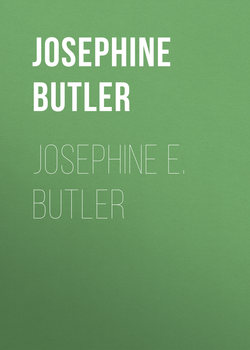Читать книгу Josephine E. Butler - Butler Josephine Elizabeth Grey - Страница 7
CHAPTER V.
EDUCATION OF WOMEN
ОглавлениеAmong the subjects concerning which my husband advanced with a quicker and firmer step than that of the society around him in general, stands that of the higher education of women. It may be difficult for the present generation to realise what an amount of dogged opposition and prejudice the pioneers of this movement had to encounter only some twenty-five years ago. We have made such rapid strides in the direction of women’s education, that we almost forget that our ladies’ colleges, higher examinations, and the various honours for which women compete so gallantly with men, are but of yesterday. Miss Clough called at our house in Liverpool one day in 1867, to ascertain the state of mind of the Principal of the Liverpool College in regard to the beautiful schemes, which were even then taking shape in her fruitful brain for the benefit of her fellow-women. I think she was heartily glad to find herself in a house where not a shadow of prejudice or doubt existed, to be argued down or patiently borne with until better days. My husband even went a little further, I believe, than she did at that time, in his hopes concerning the equality to be granted in future in the matter of educational advantages for boys and girls, men and women. An active propagandist work was started soon after by James Stuart, of Trinity College, Cambridge, who made Liverpool his head-quarters during his first experiment in establishing lectures for ladies, which developed into the University Extension Scheme. It was arranged that the first course should embrace four of the most important towns of the North of England, constituting a sort of circuit. It seemed desirable that a man of experience and weight in the educational world should inaugurate this experiment by a preliminary address or lecture, given to mixed audiences, in each of these four towns. My husband undertook this task. His first address was given at Sheffield, where he was the guest of Canon Sale, who approved heartily of the movement. Without unnecessarily conjuring up spectres of opposition in order to dismiss them, he carefully framed his discourse so as to meet the prejudices of which the air, at that time, was full. It was generally imagined that a severer intellectual training than women had hitherto received would make them unwomanly, hard, unlovely, pedantic, and disinclined for domestic duties, while the dangers to physical health were dolorously prophesied by medical men and others. In concluding his inaugural address, my husband said: “A community of women, established purposely to educate girls and to train teachers, was not known in Christendom till the institution of the Ursulines by Angela dà Brescia, in 1537. So unheard of at this time was any attempt of women to organise a systematic education for their own sex, that when Françoise de Saintange undertook to found such a school at Dijon she was hooted in the streets, and her father called together four doctors learned in the laws, ‘pour s’assurer qu’instruire des femmes n’était pas un œuvre du démon.’ Even after he had given his consent, he was afraid to countenance his daughter, and Françoise, unprotected and unaided, began her first school in a garret. Twelve years afterwards she was carried in triumph through the streets, with bells ringing and flowers strewed in her path, because she had succeeded
